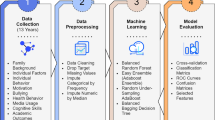Abstract
Addressing the issue of high school non-completion poses a crucial challenge for contemporary education. This research introduces a machine learning-based methodology to identify students at risk of failure and abandonment in a specific Brazilian state, aiming to establish an early warning system utilizing academic, socioeconomic, and performance indicators for proactive interventions. The methodology followed here ensures the explainability of predictions and guards against bias in relation to certain features. The analysis of data from 79,165 students resulted in the creation of six accurate classification models, with accuracy rates ranging from 69.4% to 92.7%. This underscores the methodology’s effectiveness in identifying at-risk students, highlighting its potential to alleviate failure and abandonment. The implementation of this methodology could positively influence proactive educational policies and enhance educational metrics within the state.
Access this chapter
Tax calculation will be finalised at checkout
Purchases are for personal use only
Similar content being viewed by others
References
Amparo, D.M.d., Galvão, A.C.T., Cardenas, C., Koller, S.H.: A escola e as perspectivas educacionais de jovens em situação de risco. Psicologia Escolar e Educacional 12(1), 69-88 (2008). https://doi.org/10.1590/S1413-85572008000100006
Attaran, M., Attaran, S.: Opportunities and challenges of implementing predictive analytics for competitive advantage. In: Applying Business Intelligence Initiatives in Healthcare and Organizational Settings, pp. 64–90 (2019)
Cechinel, C., et al.: Mapping learning analytics initiatives in Latin America. Br. J. Educ. Technol. 51(4), 892–914 (2020)
Chatti, M.A., Dyckhoff, A.L., Schroeder, U., Thüs, H.: A reference model for learning analytics. Int. J. Technol. Enhanced Learn. 4(5–6), 318–331 (2013)
Chung, J.Y., Lee, S.: Dropout early warning systems for high school students using machine learning. Child Youth Serv. Rev. 96, 346–353 (2019)
Clow, D.: The learning analytics cycle: closing the loop effectively (2012)
Deho, O.B., Zhan, C., Li, J., Liu, J., Liu, L., Le Duy, T.: How do the existing fairness metrics and unfairness mitigation algorithms contribute to ethical learning analytics? Br. J. Edu. Technol. 53(4), 822–843 (2022)
Elistia, E., Syahzuni, B.A.: The correlation of the human development index (HDI) towards economic growth (GDP per capita) in 10 Asean member countries. JHSS (J. Hum. Soc. Stud.) 2(2), 40–46 (2018)
Esbenshade, L., Vitale, J., Baker, R.S.: Non-overlapping leave future out validation (nolfo): Implications for graduation prediction. prePrint . https://doi.org/10.35542/osf.io/tx8cy
Ferguson, R.: Learning analytics: drivers, developments and challenges. Int. J. Technol. Enhanced Learn. 4(5/6), 304–317 (2012)
Ferguson, R., et al.: Research evidence on the use of learning analytics: implications for education policy (2016)
Ferreira, S.G., Ribeiro, G., Tafner, P.: School abandonment and dropout in Brazil. Technical report, Rio de Janeiro, Brazil (2022)
Gómez-Pulido, J.A., Park, Y., Soto, R.: Advanced techniques in the analysis and prediction of students’ behaviour in technology-enhanced learning contexts (2020)
Hernández-Leal, E., Duque-Méndez, N.D., Cechinel, C.: Unveiling educational patterns at a regional level in Colombia: data from elementary and public high school institutions. Heliyon 7(9), e08017 (2021)
Herodotou, C., Rienties, B., Boroowa, A., Zdrahal, Z., Hlosta, M., Naydenova, G.: Implementing predictive learning analytics on a large scale: the teacher’s perspective. In: Proceedings of the Seventh International Learning Analytics & Knowledge Conference, pp. 267–271 (2017)
Instituto Nacional de Estudos e Pesquisas Educacionais Anísio Teixeira (INEP): Censo Escolar 2021 (2022). https://qedu.org.br/uf/32-espirito-santo. Accessed 1 Jan 2024
Krüger, J.G.C., de Souza Britto Jr., A., Barddal, J.P.: An explainable machine learning approach for student dropout prediction. Expert Syst. Appl. 233, 120933 (2023)
Lemaître, G., Nogueira, F., Aridas, C.K.: Imbalanced-learn: a python toolbox to tackle the curse of imbalanced datasets in machine learning. J. Mach. Learn. Rese. 18(17), 1–5 (2017). http://jmlr.org/papers/v18/16-365.html
Lorenzon, L.N.: Análise comparada entre regulamentações de dados pessoais no brasil e na união europeia (lgpd e gdpr) e seus respectivos instrumentos de enforcement. Revista do Programa de Direito da União Europeia 1, 39–52 (2021)
Márquez-Vera, C., Cano, A., Romero, C., Noaman, A.Y.M., Mousa Fardoun, H., Ventura, S.: Early dropout prediction using data mining: a case study with high school students. Expert Syst. 33(1), 107–124 (2016)
Moissa, B., Gasparini, I., Kemczinski, A.: A systematic mapping on the learning analytics field and its analysis in the massive open online courses context. Int. J. Distance Educ. Technol. (IJDET) 13(3), 1–24 (2015)
OECD: Benchmarking Higher Education System Performance. OECD Publishing, Paris, France (2019). https://doi.org/10.1787/be5514d7-en
Parr, A.K., Bonitz, V.S.: Role of family background, student behaviors, and school-related beliefs in predicting high school dropout. J. Educ. Res. 108(6), 504–514 (2015)
Queiroga, E.M., et al.: Experimenting learning analytics and educational data mining in different educational contexts and levels. In: 2022 XVII Latin American Conference on Learning Technologies (LACLO), pp. 1–9. IEEE (2022)
Queiroga, E.M., Batista Machado, M.F., Paragarino, V.R., Primo, T.T., Cechinel, C.: Early prediction of at-risk students in secondary education: A countrywide k-12 learning analytics initiative in Uruguay. Information 13(9), 401 (2022)
Stanek, C.: The educational system of Brazil. IEM Spotlight 10(1), 1–6 (2013)
Wirth, R., Hipp, J.: Crisp-dm: Towards a standard process model for data mining. In: Proceedings of the 4th International Conference on the Practical Applications of Knowledge Discovery and Data Mining, vol. 1, pp. 29–39. Springer, London (2000)
Yakunina, R., Bychkov, G.: Correlation analysis of the components of the human development index across countries. Procedia Econ. Finan. 24, 766–771 (2015)
Yau, J.Y.K., Ifenthaler, D.: Reflections on different learning analytics indicators for supporting study success. Int. J. Learn. Anal. Artif. Intell. Educ.: IJAI 2(2), 4–23 (2020)
Acknowledgments
This work was supported by Inter American Development Bank and Unibanco Institute. Cristian Cechinel was partially supported by the Brazilian National Council for Scientific and Technological Development (CNPq) (grants 305731/2021-1 and 409633/2022-4).
Author information
Authors and Affiliations
Corresponding author
Editor information
Editors and Affiliations
Rights and permissions
Copyright information
© 2024 The Author(s), under exclusive license to Springer Nature Switzerland AG
About this paper
Cite this paper
Queiroga, E.M. et al. (2024). Anticipating Student Abandonment and Failure: Predictive Models in High School Settings. In: Olney, A.M., Chounta, IA., Liu, Z., Santos, O.C., Bittencourt, I.I. (eds) Artificial Intelligence in Education. AIED 2024. Lecture Notes in Computer Science(), vol 14829. Springer, Cham. https://doi.org/10.1007/978-3-031-64302-6_25
Download citation
DOI: https://doi.org/10.1007/978-3-031-64302-6_25
Published:
Publisher Name: Springer, Cham
Print ISBN: 978-3-031-64301-9
Online ISBN: 978-3-031-64302-6
eBook Packages: Computer ScienceComputer Science (R0)




